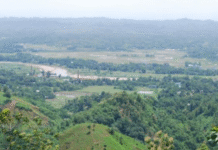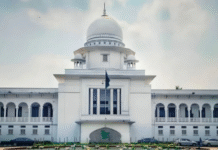Speakers at a dialogue here on Saturday stressed going for a new holistic approach of building disaster resilience to tackle the increasingly overlapping shocks of natural disasters and economic crisis.
They recommended appropriate macro-economic and disaster management policies at local and regional levels to cope up with the overlapping shocks in the global economy, politics and climate.
The frequently happening natural disasters are being translated into economic difficulties, and the greater economic integration that is the order of the world is also leading to frequent transmission of economic crisis of a certain region to the rest of the world, they pointed out at the dialogue.
The dialogue titled ‘Building Resilience to Natural Disasters and Major Economic Crisis’ was organised by Centre for Policy Dialogue (CPD) at Brac Inn Centre.
In his keynote presentation, United Nations Economic and Social Commission for Asia Pacific (UNESCAP), Bangkok, regional advisor Sanjay Kumar Srivastava noted that economic losses from natural disasters are rising globally.
In 1980, the global economic loss caused by disasters was below US$ 100 billion, whereas it exceeded the US$ 300 billion mark in 2010, he added.
Srivastava said although Asia Pacific has not been the breeding grounds for financial crisis, the region has been hit hard due to greater financial integration.
CPD distinguished fellow Debapriya Bhattacharya said the approach of the macro-economic policies should be appropriated to take up the challenges of the overlapping economic and natural shocks.
Referring to the huge experience of Bangladesh’s in disaster risk management, he said public expenditure, particularly for building infrastructures, has been playing a vital role in mitigating and adjusting with the frequently visiting disasters in the country.
Given the increase in climatic threats, the local level policy for disaster risk reduction must incorporate the aspects of the economic risks linked with the disasters.
For a comprehensive planning in disaster risk management, a comprehensive understanding about the channels of transmission of shocks to the economy, both locally and globally, is needed, he said.
Debapriya also pointed out that there are other dimensions of the new situation. “Political shocks can add up to the remaining dangers of natural disasters in the era of economic crisis,” he said.
Chaired and moderated by CPD chairman Prof Rehman Sobhan, the dialogue was also addressed by former research director of Bangladesh Institute of Development Studies (BIDS) Asaduzzaman, chairman of the Parliamentary Standing Committee on Ministry of Food and Disaster Management Saber Hossain Chowdhury and BNP chairperson’s adviser Osman Farruk.
Source: UNBConnect











Do the donors ever care to investigate how much of the donation reaches the target people and how much is just swallowed up midway? It’s shocking that here are sharks in the policymakers and ‘executors’ who must first secure their share of the aids/grants/donations before releasing the amount for actual fieldwork. Most unfortunately, the donors have hardly been so active in that and that’s why even a good bulk of the ‘sidr’ and ‘aila’ victims are yet to get as much help as they were promised to rehabilitate them. People like us are just confounded to see that billions of dollars are spent on different infrastructures which either collapse even before completion or a few months, and barely a year, after their completion. Does all this happen within the knowledge of the donors? We are really perplexed!